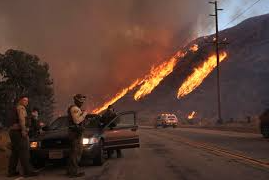
António Guterres calls for immediate action to reduce emissions and support a sustainable future in his New Year message.
The world has just concluded a “decade of extreme heat”, with 2024 marking the final year of this record-breaking period, according to the United Nations. In his annual New Year’s address, UN Secretary-General António Guterres highlighted that the 10 hottest years on record have all occurred in the past decade, including 2024.
The World Meteorological Organization (WMO) is set to release the official temperature data for the year in January, with early indications suggesting that 2024 will be the warmest year on record. This marks the culmination of a decade of exceptional heat, largely driven by human activity, and contributing to increasingly severe weather events. Greenhouse gas levels continue to rise, further exacerbating the situation by trapping more heat in the atmosphere.
Guterres warned that the world is facing a climate emergency. “We have just lived through a decade of deadly heat. The 10 hottest years have been in the last 10 years, including this one. This is climate collapse in real-time,” he said. He emphasised the urgency of taking action, stating that by 2025, nations must significantly reduce emissions and embrace renewable energy to steer the planet towards a safer future. “It is essential, and it is possible,” he concluded.
Celeste Saulo, the WMO’s Secretary-General, added that even a small rise in temperature can result in severe climate events, stressing that temperature alone does not fully capture the scope of the crisis. “This year, we witnessed record-breaking rainfall, floods, and devastating loss of life across the globe,” Saulo explained. “Tropical cyclones caused significant human and economic damage, and heatwaves affected numerous countries, with temperatures exceeding 50°C on multiple occasions.”
The WMO also pointed to a new report showing that climate change played a role in intensifying 26 out of 29 extreme weather events studied by the World Weather Attribution (WWA) network in 2024, resulting in over 3,700 fatalities and displacing millions of people. The report also noted that climate change added 41 extra days of dangerous heat throughout the year.
As global temperatures continue to rise and extreme heat worsens, the WMO stressed the importance of international collaboration to address the escalating risks posed by heatwaves and other climate-related disasters.










